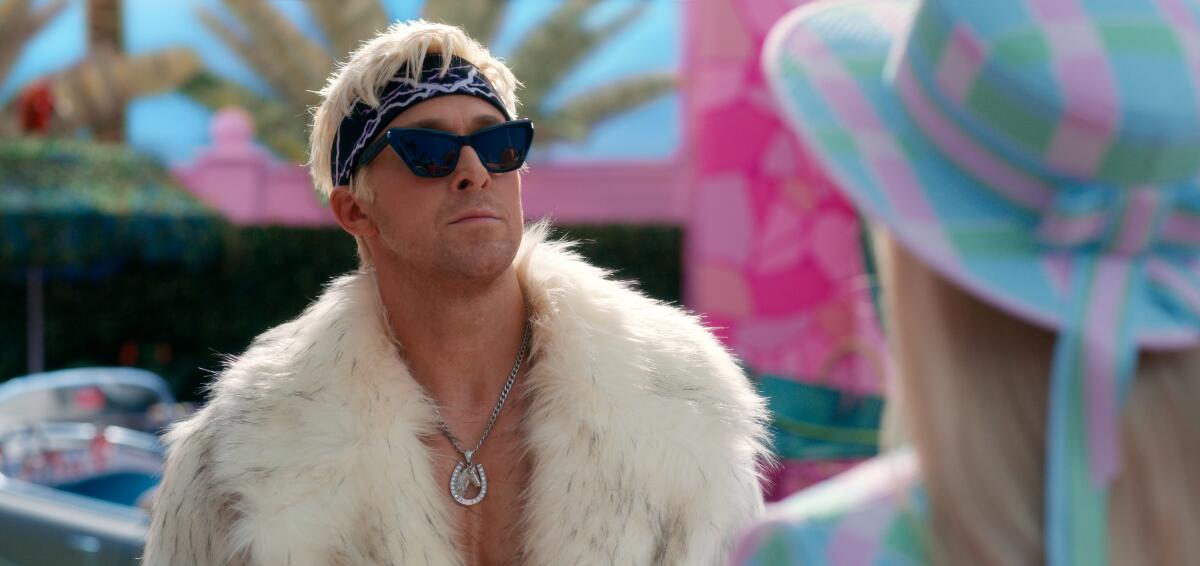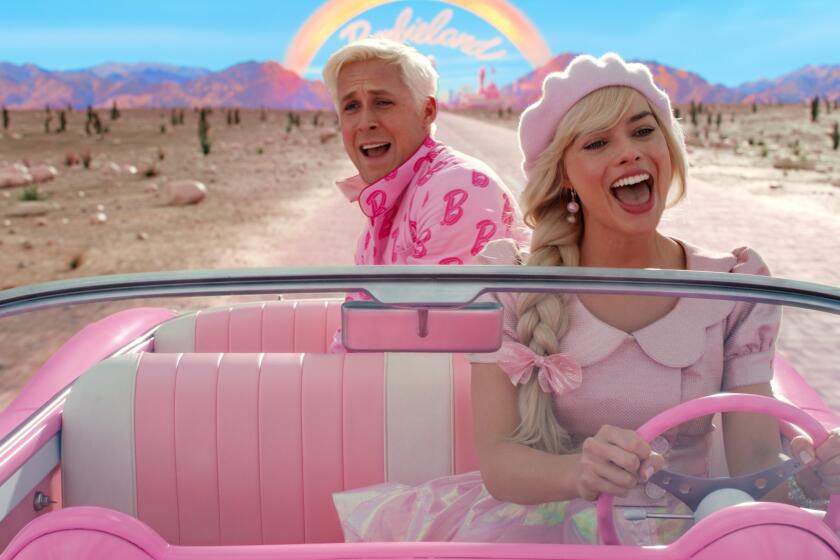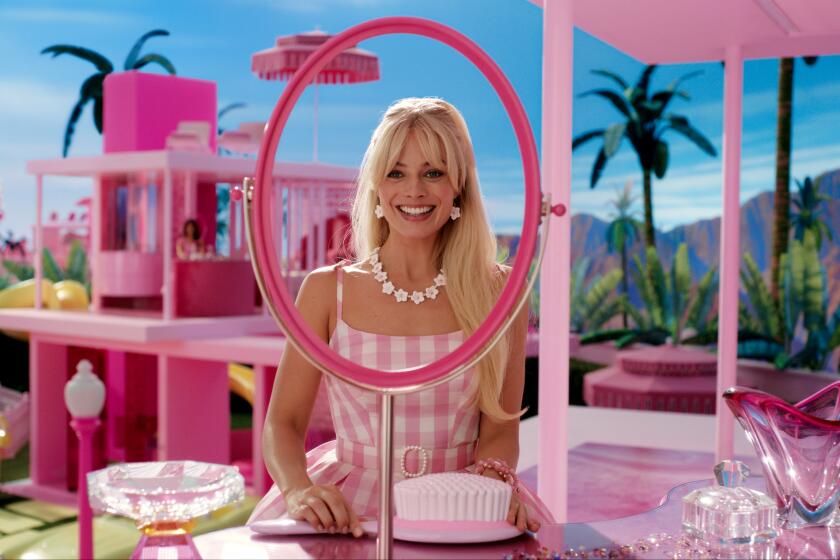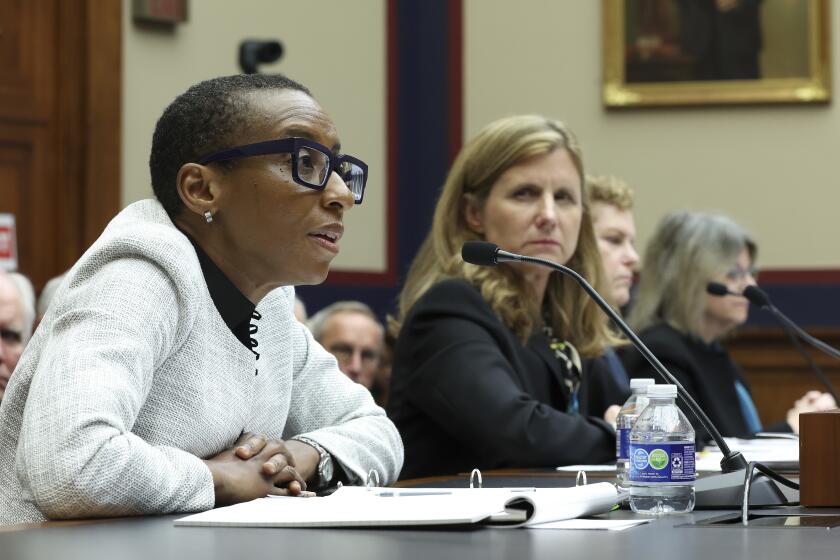Column: The ‘Barbie’ movie’s radical message: We all need more ‘Kenpathy’

Greta Gerwig’s box office hit “Barbie” may be a comedy, but many viewers are taking it seriously. Critics are having temper tantrums. Fans are moved to tears.
Why is this film about a toy provoking such strong reactions?
It’s not just right-wing pundits who are reacting fiercely, such as Ben Shapiro burning dolls in disgust. Ordinary people are moved to action, too. Women are breaking up with boyfriends. Others are red-flagging dating prospects who disliked the movie. On the left, it has become a litmus test for healthy masculinity.
Opinion Columnist
Jean Guerrero
Jean Guerrero is the author, most recently, of “Hatemonger: Stephen Miller, Donald Trump and the White Nationalist Agenda.”
Conservatives attacking the film as anti-male propaganda are ignoring its central message, which is that patriarchy harms everyone, regardless of gender. But some progressives caricaturing every detractor as a dweeb may be missing the subtext: a world that disregards men and their feelings is an inverted form of patriarchy and also cruel.
In the film, Ryan Gosling’s Ken feels marginalized in Barbie Land, where Barbies rule everything and Kens are second-class citizens. In a visit to the real world, Ken is awed to discover that he’s respected there.
He brings the patriarchy to Barbie Land, and when Margot Robbie’s Barbie confronts Ken in the nightmarish Kendom, he tells her his house is his alone, not hers — an echo of what she once said to him. For the first time, his face conveys real pain. “How’s that feel?” he asks Barbie. “It is not fun, is it?”
Looking at her history and evolution, Barbie is clearly a strong, independent woman — the sort advocated by all four waves of feminism.
Gosling’s portrayal of a bumbling but often sympathetic Ken serves a purpose. We can’t help but root for him, even at his most wayward. His humanity is irrepressible, regularly cracking the walls of his caricature.
Spoiler alert: After Robbie’s Barbie and America Ferrera’s Gloria, a Latina mom from the real world, work together to dismantle the Kendom, Gosling’s Ken bursts into tears. Barbie apologizes for taking him for granted for so long. She encourages Ken to discover his own identity and self-worth.
The film is a rare product of mainstream culture that invites men to reimagine masculinity for their own sake. It acknowledges the identity crisis and loss of hope, economic promise and life purpose among American men. These struggles are often ignored by progressives, but conveniently and poisonously exploited by right-wing manfluencers from Andrew Tate to Josh Hawley.
Barbiephobes might say I became a feminist despite Mattel’s sexist grooming. They probably never played with Barbie.
Men represent almost 3 in 4 “deaths of despair” — from suicide, alcohol abuse and overdose. They’re lonelier than women, with a bigger decline in close friendships. Women are outpacing men in school and in the workplace.
The film’s reception has focused on its messages of women’s empowerment, but what makes it a radical story is that it also invites women to reimagine feminism so that it doesn’t ignore male struggles. Ken sings: “What will it take for her to see the man behind the tan and fight for me?” Near the film’s end, when the Barbies have the option to restore Barbie Land exactly as it was, they choose not to. Issa Rae’s President Barbie says: “No Barbie or Ken should be living in the shadows.”
Perhaps that’s why right-wing extremists hate the movie — equality is scary even in a toy universe.
In her 2004 book about masculinity, “The Will to Change,” bell hooks argued against ideas of men as the enemy and as universal beneficiaries of patriarchy, a false notion introduced by women with class privilege. “Women who have been raised in poor and working-class homes have always been acutely aware of the emotional pain of the men in their lives,” she wrote.
With ‘Barbie,’ it seems director Greta Gerwig wanted to comment on our youth-obsessed culture and remind us that there is beauty in people of all ages.
At the beginning of the film, Robbie’s Barbie embodies the feminism that hooks critiqued: individualistic and inhuman, like patriarchy. She’s mythically happy and self-sufficient. When human thoughts begin to intrude in her mind, she’s horrified. “You’re gonna start getting sad and mushy and complicated,” Kate McKinnon’s Weird Barbie warns. Barbie can’t imagine a more terrible fate. But in the end — major spoiler warning — she chooses to become human.
Gerwig’s film is a call to humanity. “I’m weird and I’m dark and I’m crazy,” Gloria says proudly, after her daughter reveals that those are precisely the traits she loves about her mom — the traits she tries to hide. Some may see the film as anti-male because the Kens are weirder and darker and crazier than anyone. But they’re overlooking this point — flaws, mistakes and messy emotions don’t negate anybody’s value.
The first time I watched the film, its portrayal of men as mostly pathetic made me sad. As the daughter of a Mexican man who struggles with mental health issues and rarely seeks help because of a sense of machismo, I felt sorry for Ken, who couldn’t find a place in the world. I worried I was having a case of misplaced empathy. But the second time I watched it, I realized I was supposed to feel for Ken. Call it “Kenpathy.” Kenpathy doesn’t negate feminism; it’s not a zero sum game. It sees the fates of men and women as entwined.
In a thoughtful essay last month, Christine Emba in the Washington Post pointed out that men can’t fix themselves or reimagine masculinity alone. “People need codes for how to be human,” she wrote.
In the film, the Barbies leave it up to Ken to find himself. One male friend of mine, a feminist who grew up playing with Barbies, was saddened by the absence of positive male role models in the film. I was disappointed by its pull-yourself-up-by-the-bootstraps mentality. But you can’t expect everything from a summer blockbuster comedy.
That the movie came close to reimagining masculinity is one reason it struck a nerve. It’s meant to provoke conversations about gender roles. Beyond that, maybe it will inspire a broader interest in the fight for equality. But we can’t achieve equality without having some Kenpathy.
A cure for the common opinion
Get thought-provoking perspectives with our weekly newsletter.
You may occasionally receive promotional content from the Los Angeles Times.








